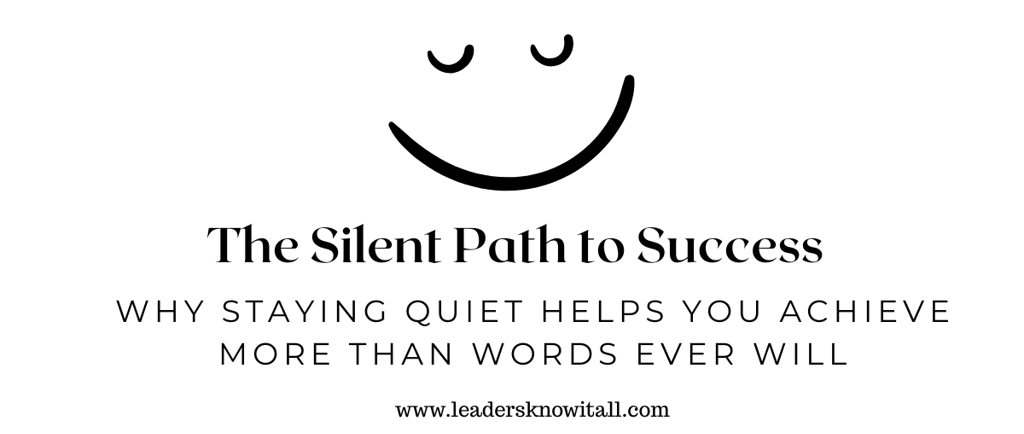The Silent Path to Success: Why Staying Quiet Helps You Achieve More Than Words Ever Will
Discover the power of silence in achieving success. Learn how great leaders like Gandhi, Buffett, Jobs, and Nadella used quiet strength, focus, and reflection to master themselves, build authority, and let results speak louder than words.
HOW TO BECOME SUCCESSFULLEARN FROM LEADERSSUCCESSCOMMUNICATION SKILLS FOR LEADERSSOFT SKILLS FOR CAREER GROWTHLEADERSHIP SKILLSHOW TO STAND OUT AT WORKSUCCESS MINDSETPOWER OF SILENCESUCCESS TIPSLESS TALK MORE ACTION
Leaders Know It All
9/22/20256 min read


The Silent Path to Success: Why Staying Quiet Helps You Achieve More Than Words Ever Will
We live in a noisy world. Everywhere you turn, there’s chatter—people talking over each other, endless notifications, meetings, opinions, arguments, and constant “updates” that feel more like distractions than real value. It almost feels like if you’re not loud, you’ll be ignored.
But here’s the thing: success doesn’t always come to the loudest voice in the room. More often, it comes to the person who knows when to stay quiet. Silence is underrated. In fact, silence might just be your biggest strength.
Let’s explore how being quiet—truly embracing silence—can help you succeed in life and work.
Silence Teaches You to Master Yourself
The first step toward success is always self-mastery. If you can’t control your own mind, emotions, or impulses, how can you expect to handle challenges, people, or big goals?
Silence is the perfect teacher. When you sit quietly—without distractions, without the urge to fill the space with words—you start to notice what’s really going on inside you. You catch those thoughts of doubt and fear before they spiral. You become more patient. You stop reacting to every little thing.
Take Mahatma Gandhi, for example. Though known for his speeches and writings, Gandhi often observed entire days of silence. He believed silence purified his mind and gave him clarity. These moments of self-mastery allowed him to channel his energy into leading one of the greatest freedom movements in history—without raising his voice in violence.
That’s powerful. Because once you can master yourself, you can master almost anything else.
Silence Makes You a Better Listener
Have you ever noticed how most people don’t really listen? They’re just waiting for their turn to talk.
But when you stay quiet, when you genuinely listen, you suddenly see the world differently. You pick up on details others miss—the hesitation in someone’s voice, the things they don’t say, the real emotion behind their words.
This isn’t just about being kind (though it is). It’s also practical. In business, leadership, or relationships, listening carefully gives you an edge. You know more, you understand better, and you earn people’s trust.
Warren Buffett, one of the world’s most successful investors, is famously soft-spoken. He often says that listening carefully has been one of the biggest reasons for his success. By staying quiet and letting others talk, Buffett gathers insights, detects weaknesses, and spots opportunities that others miss.
Sometimes the smartest thing you can say is… nothing at all.
Silence Gives You Patience and Wisdom
We live in a culture of instant reactions. Someone criticizes us, and we rush to defend ourselves. We get an email, and we feel pressured to respond right away. But silence gives you a pause.
It’s in that pause that wisdom is born. Instead of reacting, you reflect. Instead of rushing, you choose your moment.
Think of a chess player—they don’t win by moving quickly, they win by moving wisely. Silence works the same way. It gives you time to see the bigger picture.
Barack Obama is a good example. Known for his calm, composed style, he often paused before answering questions, even in high-pressure situations. That moment of silence wasn’t hesitation—it was reflection. It showed patience, and it gave weight to his words.
Silence Protects Your Energy
Every argument, every unnecessary debate, every gossip-filled conversation drains your energy. And success requires energy—lots of it.
When you choose silence, you stop wasting your power on things that don’t matter. You save it for what does matter: your goals, your dreams, your work.
A.P.J. Abdul Kalam, India’s “Missile Man” and former President, embodied this principle. Known for his humility and quiet nature, he rarely wasted time in petty debates or unnecessary noise. Instead, he poured his energy into research, innovation, and mentoring young people. His silence wasn’t weakness—it was focus.
It’s not about shutting people out—it’s about being selective. Not every fight is worth fighting. Not every conversation deserves your words.
Silence Fuels Creativity
Noise kills creativity. If your mind is always cluttered with endless chatter, where’s the space for new ideas?
Some of the greatest thinkers—Einstein, Tesla, Steve Jobs—were known to seek silence. They needed it to imagine, to connect ideas, to innovate.
When you sit quietly, you give your subconscious mind room to work. Suddenly, a solution appears, or a new perspective clicks into place. That’s why some of your best ideas pop up when you’re showering, walking alone, or lying in bed before sleep.
Nikola Tesla, one of the most brilliant inventors in history, spent hours in solitude. He often visualized entire machines in his mind during silent reflection before ever sketching them out. Without that silence, his breakthroughs in electricity might never have happened.
Similarly, Steve Jobs was known for taking long walks in silence when making important decisions or brainstorming new ideas. Some of Apple’s biggest innovations were born in those quiet walks.
Silence creates space. And space is where creativity lives.
Silence Builds Confidence and Authority
Funny thing: the person who talks the least in a room often has the most power.
Why? Because silence shows confidence. If you don’t feel the need to fill every gap with words, people sense that you’re secure. And when you finally do speak, everyone listens.
Leaders who know when to be silent command more respect. Their words carry weight because they’ve been chosen carefully, not thrown around carelessly.
Tim Cook, the CEO of Apple, is naturally reserved. Unlike his predecessor Steve Jobs, Cook doesn’t dominate conversations with charisma. Instead, he leads quietly—with calm authority. When he speaks, people listen, precisely because he doesn’t speak all the time.
The same is true for Satya Nadella, CEO of Microsoft. His soft-spoken, thoughtful style transformed Microsoft into one of the world’s most valuable companies. His silence communicates confidence, and his words inspire because they are measured.
So if you want to build authority, don’t always try to be the loudest. Be the one who speaks less, but better.
Silence Helps You Focus on Action
Let’s be honest—most people talk more about their goals than they actually work on them. They announce plans, share dreams, and brag about “what’s coming next.” But talk doesn’t equal results.
Silence, on the other hand, keeps you focused. Instead of announcing your every move, you quietly work on it. By the time people notice, your results are already speaking for you.
Many great achievers believe in working silently and letting results make the noise. Amancio Ortega, the billionaire founder of Zara, is one of the richest men in the world, yet he avoids the spotlight. He rarely gives interviews, never flaunts his wealth, and quietly built one of the biggest fashion empires.
That’s real success. Not in the noise of promises, but in the quiet of action.
Silence Brings Peace
At the end of the day, success isn’t just about money or recognition—it’s also about peace of mind. And silence is deeply healing.
Ten minutes of silence in the morning can reset your entire day. A few moments of quiet reflection at night can help you let go of stress. Whether it’s meditation, a silent walk, or just sitting with yourself, silence grounds you.
Dalai Lama practices silence and meditation as a way to stay centered. Despite being a global leader, he spends hours in quiet reflection daily. That silence not only brings him peace but also strengthens his ability to guide millions with compassion and clarity.
A peaceful mind makes better decisions. A peaceful mind lasts longer in the game. And success is a long game.
Knowing When to Speak and When to Stay Quiet
Silence doesn’t mean never speaking. It means knowing the value of both words and pauses.
In conflicts, silence can calm the fire.
In negotiations, silence makes the other person reveal more.
In leadership, silence lets others shine.
In learning, silence opens the door to wisdom.
Silence is a tool. Use it with intention, and it becomes a secret weapon. As the saying goes: “Speak only if it improves upon the silence.”
How to Bring More Silence Into Your Life
Start your day quietly. Don’t grab your phone right away. Spend 10 minutes with yourself.
Listen more than you speak. Try the 70/30 rule: 70% listening, 30% talking.
Take silent breaks. A few minutes of quiet in the middle of a busy day works wonders.
Keep your goals private. Work quietly, let results announce themselves.
End your day in silence. Reflect before you sleep.
Small habits, big difference.
The Beautiful Paradox of Silence
Silence is often mistaken for weakness. People assume if you’re quiet, you have nothing to say. But silence is the opposite of weakness—it’s strength.
It takes courage to stay quiet when others are shouting. It takes self-control to listen when you’re dying to argue. And it takes wisdom to know that silence can often say more than words ever will.
Gandhi’s silence gave him clarity.
Buffett’s silence gave him wealth.
Obama’s silence gave him wisdom.
Jobs’ silence gave him creativity.
Cook’s silence gave him authority.
Ortega’s silence gave him an empire.
When you learn to embrace silence, you learn to let your actions, your results, and your presence do the talking.
Because in the end, the loudest sound of success… is often silence.
Love and Light
Leaders Know It All
